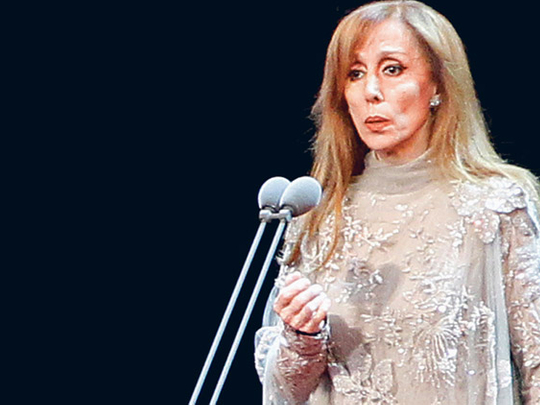
Beirut: The events that transpired on December 3 at the Hadath (Southern Beirut) campus of the Lebanese University shocked many Lebanese.
A major controversy erupted after students who were either Hezbollah members or sympathisers of the party halted a ceremony to mark the death of Mohammad Hamadi, an engineering student. Hamadi’s friends from the Faculty of Engineering had organised the event to mark the passage of 40 days since his death, invited family members — including the deceased’s mother — and planned to broadcast a few Fairouz songs, because Hamadi was a huge fan of the Lebanese diva and the patriotic numbers she had sung.
Fairouz celebrated her 81st birthday on November 21 and is dubbed the “first lady of Lebanese singing”. In fact, she is the closest thing to a national figure that Lebanon has produced, her marvellous voice winning fans across the Arab World. The university incident is all the more galling since Fairouz has in the past expressed admiration of Hezbollah and its leader, Hassan Nasrallah. The artist’s patriotic songs about Lebanon stand out as majestic renderings but therein lies the problem: Iranian-inspired Hezbollah ideologues frown on singing.
Hezbollah issued a statement on Monday claiming that the incident was a matter between the student council and the faculty though that excuse only served to add fuel to the fire. The militia said that what happened was down to the implementation of an agreement between the student council, faculty administration and students groups, but it had earlier asserted that the ban was imposed since the student meeting coincided with a religious occasion. Arguments that students were within their rights to ban the commemoration were erroneous because university regulations forbid all political and sectarian gatherings, which students affiliated with the group hold on a regular basis, including a vocal display of allegiance to Iran and its velayet-e faqih ideology.
While a majority of the students at the Hadath campus of the university are Shiite, the unified sciences complex draws students from all regions and faiths, a reflection of the country’s demographic and cultural mosaic. Social media sites like Facebook and Twitter recorded thousands of condemnations of Hezbollah, most of which originated from those who rejected “the black ideology, in the name of the resistance, [whose] values,” they claimed, “were being imposed over the nation”.
Commenting on the incident, Education Minister Elias Bou Saab told Al Jadeed Television: “everybody’s freedoms will be preserved as stipulated by the law”, though his dismissive comments that media outlets were partially responsible for the controversy were rejected.
Every political party took the view that Hezbollah had crossed a dangerous threshold, with the youth and student division of the Lebanese Communist Party describing the action as “sectarian”, while the Phalange Party affirmed that “the practices of Hezbollah target the essence of the civil state based on which Lebanon was established.”
Others said the ban on Fairouz songs came as “a threat to the concept of pluralism and public liberties”, with the student body of the National Liberal Party denouncing what it called the “strangling of liberties on the Lebanese University campus in Hadath”. It further urged the deans of the university to “deal strictly with the ideology that Hezbollah is trying to implant at the public university”.
Progressive Socialist Party leader Walid Jumblatt probably offered the best reaction when he countered on his Twitter account: “Do not deprive us of the prayer of Jerusalem, the prayer of Fairouz,” and shared a link of the song ‘O Jerusalem’.












